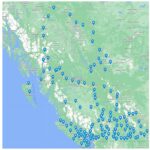
On September 6, 2024, the B.C. government announced the near completion of the province’s Electric Highway. The project is an electric vehicle charging network that spans the entire province and reaches into Alaska, Yukon, the Northwest Territories, Montana, Idaho and Alberta.
The Electric Highway will consist of over 310 DC fast chargers located at 155 charging sites. Stations will be placed every 150 kilometres on major roads and highways. Additional Level 2 chargers will also be offered at some stations.

A map of the Electric Highway. Source: Government of B.C.
In addition to the completion of the Electric Highway, B.C. announced on Sept. 6, 2024, a $14 million funding increase to the GoElectric Home and Workplace Charger Program. The program supports individuals and businesses in installing EV chargers in their homes and workplaces.
Early in 2025, BC Hydro will begin introducing 400 kW charging stations. These chargers can provide up to 100 km of charge in 2-3 minutes. They will be included in the Electric Highway.
The Electric Highway is scheduled to open by the end of September 2024.
The completion of the Electric Highway was an important goal of the CleanBC program, which is the provincial government’s plan to lower emissions by 40% by 2030. The program has several strategies to lower emissions, which are outlined in “Roadmap to 2030”, published in 2021. One of those strategies is the development of an extensive EV charging network. When the document was originally published, CleanBC aimed to complete the Electric Highway by 2024. Another target was to have 10,000 public charging stations up and running by 2030.
B.C.’s Electric Highway is a significant component of EV adoption in Canada. The project addresses range anxiety, a concern that EVs do not have sufficient charge to cover large distances. The Electric Highway also improves accessibility to public charging infrastructure, an issue raised by some EV drivers.
Here is some additional information on electric vehicles in B.C.:
- EV sales in B.C. comprised 23% of market share in 2023, an increase from 18% of sales in 2022.
- B.C. was the provincial leader in EV registration in 2023 at 22.91% of the market share.
- The province expects 900,000 EVs to be on the road in the 2030s.
- As of August 2024, there are 5,300 EV public charging stations in operation in B.C.
If you would like to learn more about public EV charging, check out our in-depth guide.











